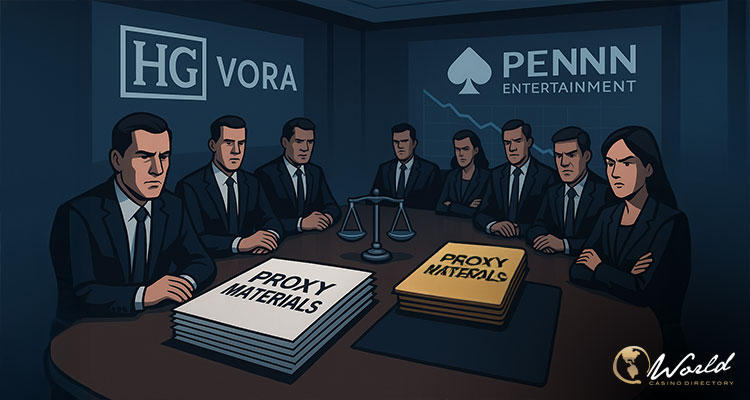HG Vora Capital Management has intensified its confrontation with Penn Entertainment, seeking to secure greater influence on the board amid mounting dissatisfaction with the company’s strategic direction and financial performance. The activist investor, which holds a 4.8% equity stake in the gaming operator, is pushing to install three independent directors at Penn’s upcoming annual meeting scheduled for June 17.
The dispute emerged after Penn’s board reduced the number of board seats up for election from three to two, prompting HG Vora to file a definitive proxy statement and launch litigation. The investment firm asserts this maneuver is a deliberate attempt to block the nomination of William Clifford, a former CFO of Penn and Gaming and Leisure Properties.
“We believe Penn’s directors do not want Mr. Clifford in the boardroom to scrutinize their deal-making or question their strategy or leadership — even though that is exactly what is needed,” HG Vora said in a sharply critical letter to fellow shareholders.
Strategic Missteps and Costly Acquisitions Under Fire
HG Vora’s core grievance centers around Penn’s shift from a well-regarded regional casino operator to what it calls a “sports, media and technology conglomerate” — a transformation it believes has been marked by reckless financial decisions and unfulfilled promises.
The investor pointed to Penn’s acquisition of Score Media and Gaming for over $2 billion, despite the company generating less than $25 million in annual revenue at the time, and the $500 million spent on Barstool Sports. The latter deal, the letter claimed, introduced reputational risks due to the brand’s controversial nature and its founder’s conduct, which allegedly drew regulatory scrutiny.
More recently, Penn committed over $2 billion to license the ESPN Bet trademark from Disney for a decade — an amount HG Vora argues far exceeds what others were willing to pay. The firm contends that these transactions have yielded little strategic value while eroding shareholder wealth.
“Under the oversight of the board and Mr. Handler — who purports to be an expert in gaming and technology M&A — Penn has executed a string of transactions that, in our view, stand among the worst in the industry’s history,” the letter stated.
Lagging Stock Performance and Questionable Leadership Compensation
HG Vora’s frustrations are compounded by Penn’s prolonged stock market underperformance. The firm notes that Penn’s market capitalization has fallen by roughly $11 billion since early 2021. Despite this significant loss in shareholder value, CEO Jay Snowden has received more than $120 million in compensation over the same period — including a 70% increase in his 2024 target pay.
“Despite PENN’s abysmal track record during his tenure, Mr. Snowden is now the second highest-paid CEO among his peers,” the letter said, calling the pay raise “particularly tone-deaf.”
The activist also disputes Penn’s claim that its digital business — which includes ESPN Bet — is on track to become profitable by 2026. HG Vora pointed out that similar profit assurances were made for 2021, 2022, 2023, and 2025, none of which materialized.
“Why should shareholders trust that this time will be different when the strategy, management team and a majority of the Board members remain the same?” the letter asked.
Shareholder and Union Support Builds for Board Shakeup
HG Vora’s proposed nominees are William Clifford, Johnny Hartnett, and Carlos Ruisanchez. While Penn has agreed to put Hartnett and Ruisanchez forward for election, it excluded Clifford, prompting further accusations of entrenchment.
“In our view, that is precisely why Penn’s directors reduced the number of board seats available at the Annual Meeting,” HG Vora’s letter stated, accusing the board of “extraordinary measures to avoid accountability.”
Support for HG Vora’s nominees is not limited to the investment firm alone. UNITE HERE, a labor union representing approximately 300,000 hospitality workers — including staff at four Penn casinos — also issued a proxy statement backing the activist’s board candidates.
“This poor outcome stems in part from PENN’s multi-billion-dollar bet on Interactive gaming that is failing to achieve its market share goals,” the union stated, referencing the company’s underwhelming results and regulatory troubles related to Barstool Sports.
Litigation and Call to Action
To challenge what it calls Penn’s “Board Reduction Scheme,” HG Vora has filed a lawsuit in federal court to ensure all three of its nominees can be considered by shareholders. The firm emphasized that fair and open elections are a cornerstone of good corporate governance and that Penn’s recent actions undermine this principle.
“This election is about more than improving the board’s composition; it is about catalyzing meaningful change at Penn,” the letter concluded. “It is imperative that shareholders send a clear and unambiguous message that continued ineffective leadership, lack of accountability and entrenching actions will no longer be tolerated.”
As the June 17 meeting approaches, HG Vora is urging shareholders to vote using its gold proxy card — a move it says will signal a decisive break from Penn’s recent track record of “value-destructive deal-making” and “poor execution.”



